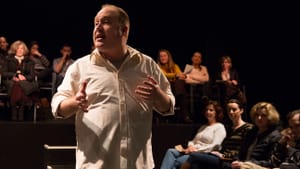Stay in the Loop
BSR publishes on a weekly schedule, with an email newsletter every Wednesday and Thursday morning. There’s no paywall, and subscribing is always free.
Theater as therapy
Jonny Donahoe in 'Every Brilliant Thing'

From the moment you enter the theater, you know it’s going to be an unusual evening.
First of all, where’s the stage? The tiny Barrow Street Theatre in Greenwich Village has been reconfigured into a square, with rows of seats facing one another on four sides. There’s no playing space in the center. In this dense configuration, you make out two narrow corridors between the rows — one vertical, one horizontal — for the cast to navigate, presumably. But then you check your program, and see that there’s no cast, save one actor called “Performer,” and he’s busy handing out slips of paper to random audience members as they enter.
So you wait in anticipation for the house lights to go down. But they never do, for the next hour. No matter — you barely notice, because you’re immersed in an experience that’s moving, unique, and all-consuming. And you’re laughing all the time — that is, when your eyes aren’t filled with tears. After all, this is a play about suicide. Who would have expected laughter in the first place?
Each playing a part
Every Brilliant Thing, the new “theatrical experience” now playing in downtown New York, was written by Duncan Macmillan with Jonny Donahoe. The latter, a young British comedian and the solo actor/host/narrator of the evening, engages us instantly, which is in his best interest, since he’ll be asking many of us to participate in the telling of his story, playing various parts and serving various functions.
Essentially, Donahoe narrates what is presumably his (or Macmillan’s) personal story — how he got through his life until now (he’s in his mid-30s) with a mother who first attempts suicide when he was seven and ultimately succeeds. As his story unfolds (growing up, going to university, meeting his true love), he’ll ask one of us to stand up and play a role: that of his father, or the vet who put his dog to sleep (the audience member holds a coat in his arms and injects it with a pen), or his school teacher, or the girl he marries.
“It’s common for children of suicides to blame themselves,” Donahoe explains. So the coping mechanism — or rather, the strategy — that Donahoe embraces is to compile a list of reasons to live. He writes each reason on a little piece of paper, which he leaves everywhere for his mother to find as the months and years go by.
An ever-lengthening list
As it happens, some of these little numbered pieces of paper turn out to be the ones Donahoe distributes at the top of the show. So as he narrates his story, he occasionally calls out numbers for audience members to read. It’s a wonderful list, including reasons, for example, such as: “hugging,” “birdsong,” “biscuits,” “conversation,” “the alphabet,” “ice cream,” “Beyoncé,” “completing a task,” “listening to a record for the first time,” and so on.
As the numbers grow from #1 to #35 to #173,220 to #826,978, our shared delight grows: in the list, in each other, and in being alive. So by the time Donahoe mentions that his mother finally succeeded in committing suicide (she left no note), we’ve become Donahoe’s support group as well as our own. Meanwhile, the list continues to grow (it passes a million), becoming Donahoe’s own reason to live. And, in turn, ours.
Was she a plant?
At the point in the story when he meets his true love, Donahoe asks a slight woman in jeans sitting in the first row to come up and enact their first encounter. We laugh as he feeds her the lines. Then we realize that she is none other than Sarah Jessica Parker (of Sex and the City fame). Was she a plant? I wondered. I doubt it — but never mind. After the show, I didn’t even bother to find out, so transported was I by the spontaneity of the evening and the joy of being alive. The job of theater is to create illusions, and this one was one I wanted to keep.
“If you live a long life and you get to the end of it without being depressed, then you probably haven’t been paying attention,” says Donahoe, after he tells us that his mother killed herself and his wife eventually left him. Even so, you leave the theater with a renewed appreciation of life — indeed, with a sense of joy. And that’s a brilliant thing, isn’t it?
What, When, Where
Every Brilliant Thing, written by Duncan Macmillan with Jonny Donahoe. George Perrin directed. Through March 29 at the Barrow Street Theatre, 27 Barrow Street, New York. www.barrowstreettheatre.com
Sign up for our newsletter
All of the week's new articles, all in one place. Sign up for the free weekly BSR newsletters, and don't miss a conversation.